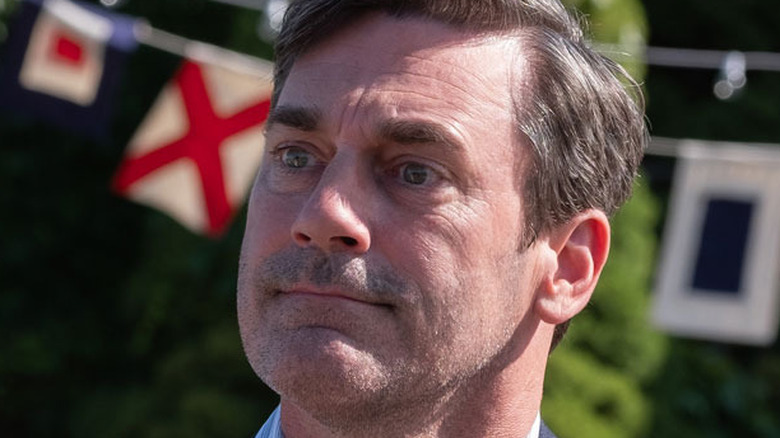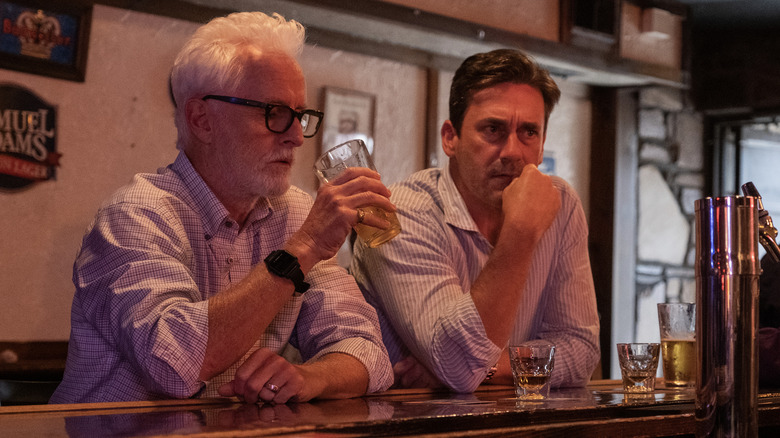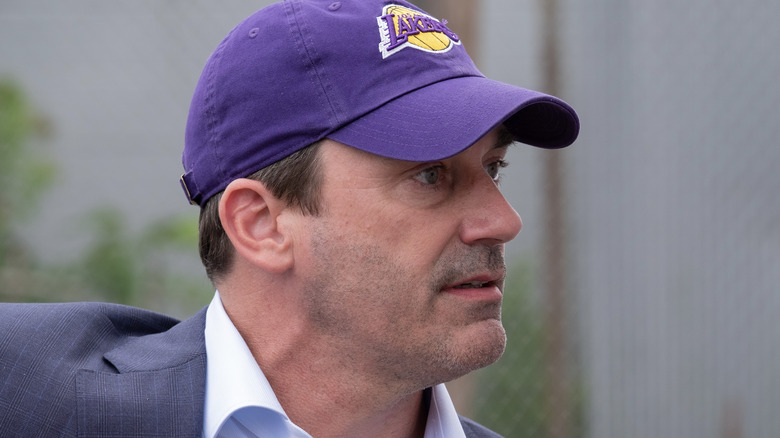Confess, Fletch Review: A Lease With An Option To Buy
- One of the funniest characters in movie history is back!
- He's not nearly as funny
- The whodunit is lazy and unfair to the audience
- The film seems determined to get as far away from Chevy Chase as possible
There may never be a remake that wants less to be a remake than "Confess, Fletch." Jon Hamm as the title character is a wholly new lease with an option to buy, and your mileage may vary.
Of course, it's not really a remake; Gregory Mcdonald published nearly a dozen proper "Fletch" books in the '70s and '80s, and the previous "Fletch" films used different ones as source material. But far more people who will see "Confess" are familiar with the 1985 "Fletch" film than the Mcdonald novels, and at this point the character of IM Fletcher has been emblazoned in pop culture's mind's eye as Chevy Chase in buck teeth. This is the first "Fletch" movie since Chevy hung up the Lakers jersey, and no matter the semantics, this is a new series aspiring to remake an old series.
It's a particularly thorny proposition (one that does not entail dressing up as Little Bo Peep), because Chevy Chase has said in multiple interviews over the years that the best parts of "Fletch" were made up by him, and by all accounts, it seems be the film where he was most allowed to improv unrestrained. This is a very Chevy Chase thing to say, which is one of the reasons any modern actor would seem foolhardy to try and play Fletch like him — who is now regarded by many as somewhere between a Harrison Ford-like cranky old man and somebody verging on full cancellation, not the '80s comedic genius he was. In his prime (which "Fletch" captured beautifully), Chase was a talent on par with peers like Bill Murray and Steve Martin, even if today he doesn't receive a fraction of the adoration.
So, what to do with poor Jon Hamm? For more than two decades, names like Jason Lee, Zach Braff, Ryan Reynolds, and even Ben Affleck were speculated to have been taking over the role — some likely planning to play closer to the Chevy Chase blueprint than others — and now, with Greg Mottola's "Confess, Fletch," the former "Mad Men" star with the long-hinted-at, somewhat-endearing comedic leanings is the guy investigating crimes in a Lakers hat. While he's certainly game, both Hamm and Mottola have little interest here in capturing the spirit of the 1985 film — which is problematic for an audience watching primarily because they love the 1985 film.
Take the opening shot, which has Hamm's Fletch walking into his darkened residence, whistling to himself; how can any self-respecting "Fletch" fan not hope he starts singing "Strangers in the night, exchanging glances"? In the spirit of "Confess, Fletch," I will confess: I've never read the Mcdonald books, only saw the movies. Perhaps this film does adhere admirably to the source material, but if so, it does so at the expense of almost anything recognizable from the classic film. This is Fletch, without the edge.
In this opening scene of "Confess," he's actually arriving in a luxury house rental in Boston, the audience soon learns; the plot kicks in quickly as he discovers a dead woman in said rental house. He calls the cops with a laissez-faire "I have nothing to hide" attitude that the character retains throughout the entire film, confident in the knowledge he didn't do it. This doesn't stop pretty much everyone around him — particularly the cops — from thinking he did.
Remember when the lawnmower drove over that guy's foot?
From there, "Confess" wants to lean heavily into a whodunit plot. There are multiple suspects, stolen art, people brandishing guns, and, of course, police detectives two steps behind every plot revelation. But the murder mystery is pedestrian at best, lazy at worst, so it quickly becomes a matter of whether the driver of this particular vehicle is worth taking the ride.
One choice that hamstrings Hamm is that in the '80s Fletch felt like something of an American James Bond — a smart aleck who will put you away and sleep with your wife while doing so. He was also always the smartest man in the room; his absurd names and disguises may have been good for a laugh, but they also underlined the notion that this guy was one step ahead of everyone. Hamm's Fletch is more of a schmuck, finding himself frequently behind the 8 ball.
The first genuine laugh took 39 minutes, by my watch. Fletch visits a pompous decorator who keeps misusing the word "bespoke," and pretending to be a reporter, he replies, "Thank you, I think I have my pull quote." It's no "Can I borrow your towel? My car just hit a water buffalo," but it's decent.
Every now and then, there's a line that feels like something 1985 Fletch would say — a cop asks him if he's been drinking for a long time and he replies, "Oh geez, I had my first beer when I was 12," somebody offers a meal he doesn't want and he replies, "Oh, no, I ate yesterday" — but even when Hamm nails one, it's hard to not think Chase would've done it better.
The "Confess" soundtrack is now soft jazz rather than upbeat '80s synth, there is a glaring lack of voiceover, and although some quirky character beats are added — he likes to take off his shoes in public places now? — Hamm never quite makes Fletch his own. There is some cute (if off-topic) stuff between Hamm and his old "Mad Men" co-star John Slattery (playing Frank, the eternally-aggrieved editor) that feels like Don Draper and Roger Sterling getting together for a drink in 2022. They complain about millennials and the #MeToo climate, Fletch half-jokingly threatens to blackmail his former boss about an old indiscretion in a storage closet. "It was a bilateral defiling," Fletch is told.
The rest of the supporting cast is solid, if unspectacular. Marcia Gay Harden is a treat under a thick accent that has her calling the main character "Flesh," Kyle MacLachlan is always a welcome presence, Annie Mumolo is fun as a scatterbrained neighbor, and Ayden Mayeri particularly shines as a rookie detective who can throw verbal barbs right back at Fletch.
Rather than Ted Nugent and G. Gordon Liddy, this Fletch does his investigative work under names like Frank Jaffe, Ralph Locke, and "Mike Wahlberg," which is at least clever as a Boston shout-out. Otherwise, this is another film set in a specific city that (other than the occasional reference to Worcester) makes little to no effort to convincingly embrace its environs.
Kareem's in the wash
I caught exactly one line that seemed to (perhaps unintentionally?) reference the original film: a villain pointing a gun at Fletch and a friend, saying, "I was prepared to commit one murder. What makes you think I won't commit two?" much like Tim Matheson did many moons ago. Out of all the great lines in "Fletch," that's the one they chose to reference? Fletch's editor is still named Frank, there's still a woman in the newsroom named Larry, and Fletch messes with a framed photo on a policeman's office wall. Other than that, you'd never know this character is in any way related to the guy who charged all those steak sandwiches to the Underhills.
Is it unfair to compare "Confess" to the classic "Fletch" if their intent was always to be more slavish to the books? Perhaps, but with references to paternity leave, ride-share vehicles, social media, GPS, and the ongoing struggles of print journalism, it's hard to imagine "Confess, Fletch" adheres too tightly to its 1976 source material. And it's unfair to expect the audience to forget the 1985 movie, so comparisons are both inevitable and in this case, insurmountable.
All that really matters is this: The best one-liner in this film is weaker than the most throwaway joke in that film. If Mottola and crew didn't want to offer Chevy Chase an acting role or cameo, perhaps they should have at least enlisted him as a writer — say what you want about the man, but nobody knows this character better.
Wrapping up its mystery, "Confess, Fletch" relies on the unholy twins of lazy clichés. First, somebody is about to shoot somebody else — then they're shot from behind, their body dropping to reveal a character who has re-appeared at just the right time. Next, everyone stands around in the aftermath and reveals numerous motivations and connections previously withheld from the viewer, thereby nullifying any fun we could have had in enjoying the film as a whodunit. If you're going to stack the deck against us, why would we want to play along?
After a few decades of wishing Fletch could return, this feels like enough to make moviegoers wish he'd go back into development hell. This might sound harsh, but ask yourself this: There are still people, four decades later, who feel passionately about "Fletch" being one of the best comedies ever made, but even four months from now, will anyone still be talking about "Confess, Fletch"?


